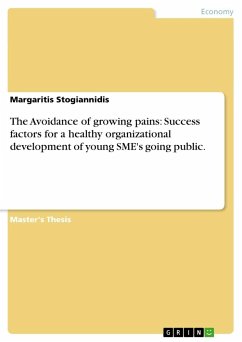
The Avoidance of growing pains: Success factors for a healthy organizational development of young SME's going public.

PAYBACK Punkte
0 °P sammeln!
Master's Thesis from the year 2013 in the subject Business economics - Business Management, Corporate Governance, grade: 2,0, University of Applied Sciences Stuttgart, course: MBA, language: English, abstract: EXECUTIVE SUMMARY In order to take advantage of growth opportunities and to avoid growth pains, SMEs must be equipped with necessary funds. An appropriate way to raise funds is represented by the public stock exchange. The objective of the present paper is to elaborate success factors that might be of assistance for SMEs when going public in order to avoid growth pains. In particular, SM...
Master's Thesis from the year 2013 in the subject Business economics - Business Management, Corporate Governance, grade: 2,0, University of Applied Sciences Stuttgart, course: MBA, language: English, abstract: EXECUTIVE SUMMARY In order to take advantage of growth opportunities and to avoid growth pains, SMEs must be equipped with necessary funds. An appropriate way to raise funds is represented by the public stock exchange. The objective of the present paper is to elaborate success factors that might be of assistance for SMEs when going public in order to avoid growth pains. In particular, SMEs have an immense backlog regarding their financial controlling, strategy, management quality, transparency and internal structure in general related to the "standard" level that has to be considered as generic requirement for a publicly held company. Thus, the starting hypothesis of the present paper is: In case an SME does not deal with such challenges in due time and appropriate manner, it will not be able to realize the growth intended with an IPO. Such discrepancies would rather lead to sustained destruction of value with the consequence of massive growth pains at the post-IPO stage. Therefore the present paper aims to analyze the relevant differences between the aforementioned areas that, after all, could have a direct impact on the performance of the organizational development of the company, in order to deduce crucial success factors for a successful initial public offering (IPO) and to avoid growth pains. This shall be achieved by analyzing the relevant literature through systematic research review, in order to capture information on the current state of research. Then, in a second step it will be aimed to conduct a theoretical analysis of different scientific concepts based on the captured discrepancies in oeder to identify parameters and measures that ought to be observed as success factors in the preparation of an SME for a forthcoming IPO. As a last step, the identified success factors ("best practice") will be assessed by a systematic analysis of recent IPOs within the last ten years, based on random samples, for the purpose of examining whether such factors gained from theoretical analysis are subsequently applied in practice. This analysis shall consider whether the performance with respect to profitability, growth and evaluation of the companies applying those success factors differ from the performance of companies evidently not applying the identified success factors. This work concludes that essential problems do not arise from asymmetric information flow but poor management quality. [...]













